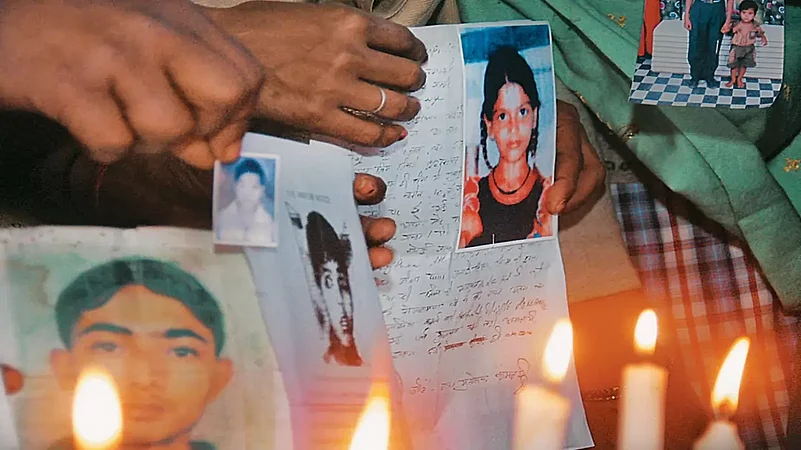Chamber No. 482 at the Ghaziabad district and sessions court in Raj Nagar, Uttar Pradesh, is well-known as the office of the ‘Nithari Lawyer’. This is the moniker given to Khalid Khan, who has represented the families of the victims in what is arguably the country’s most notorious serial murder case—the Nithari killings.
Nithari is a village in Noida, western Uttar Pradesh, about 20 km east of New Delhi. In December 2006, residents of the village accused one Surinder Koli, who worked at D5 in the village, of being involved in the disappearance of children, who had gone missing in the area for the previous two years. When several locals searched a municipal water tank behind the house, they discovered a decomposed body of a child. After Koli and his employer Moninder Singh Pandher, a businessman, were arrested on December 26 and 27, 2006, respectively, the police dug up the premises of Singh’s house and nearby areas, discovering at least 16 bodies. As rumours of child pornography, illicit organ trade and even cannibalism circulated in the media, angry villagers pelted stones at policemen in the area. “I have never seen anything like that in my life,” Khan tells Outlook. “It was so long ago.” Now, Khan represents only four of the victims’ families. “Some of the families were paid off,” he adds. “Some lost interest in the proceedings.”
In the past 16 years since the case came to light, the investigations and legal proceedings have taken several byzantine turns. Both Pandher and Koli have been convicted in several of the cases. The duo were found guilty of murdering 14-year-old Rimpa Haldar on February 8, 2005 by a special sessions court in Ghaziabad, which sentenced them to death on February 13, 2009. The Central Bureau of Investigation (CBI) had not named Pandher in their charge sheet. Then, on September 10 of the same year, Pandher was acquitted and his death sentence was overturned.
Even though the Supreme Court upheld their initial conviction in February 2011, Koli’s capital punishment was commuted in 2015 because of an inordinate delay in carrying it out. In March 2018, the CBI court in Ghaziabad awarded both Koli and Pandher death penalties in a case of rape and murder of a 25-year-old domestic help. A special CBI court in Ghaziabad awarded Pandher seven years’ imprisonment and the death penalty to Koli on May 20, 2022.
Since Koli’s initial conviction, several activists and researchers have opposed his death penalty on the grounds that he might not be of sound mental health. But Khan disagrees, “The defence has never brought up the issue of mental health.” He goes on to add, “There is nothing in his medical history to suggest mental illness. In his statements, Koli said that he was in a trance-like state when committing the crimes. He felt intense sexual desire after watching his employer (Pandher) bring home sex workers. He prepared meals for them and later he himself started luring victims to the house.”
However, the lawyer says that if a person commits crimes because of a mental disorder, they need medical assistance, not punishment. “There is no legal definition of a psychopath and no laws that specifically confront crimes by psychopaths or serial killers in India,” avers Khan.
Section 84 of the Indian Penal Code (IPC), 1860, states, “Nothing is an offence which is done by a person who, at the time of doing it, by reason of unsoundness of mind, is incapable of knowing the nature of the act, or that he is doing what is either wrong or contrary to law.” In other words, if a person commits a crime when they are unable to judge their actions because of a mental disorder or inability to make such judgements, it will not be treated as an offence under the law.
“A person may be living with a serious mental disorder like schizophrenia or bipolar disorder in which they hear voices inside their head. If they were to kill under the influence of those voices, the crime is directly linked to their mental disorder,” says UK-based forensic psychiatrist Drona Sharma. “While committing such an act, the person can be considered to be of ‘unsound mind’. But not every crime committed by a person with a mental disorder or violent predisposition is an act by an ‘unsound mind’.”
To plead insanity, the defence needs to prove that the accused was incapable of understanding the nature of the act committed by them. However, the burden of proof in this is on the defendant. Dipanwita Mitra, research associate-cum-teaching assistant, National Law University, Odisha, says it is perhaps necessary now to evolve the 19th-century codification to reflect progress in mental health as well as forensic and criminal psychiatry research.
In the European system, Sharma says, if an offender shows symptoms of serious mental disorders such as schizophrenia or bipolar disorder, or even empathy while committing the crimes, they are referred to a forensic psychiatrist, tasked with determining if the subject fits the profile of a psychopath. Noted Canadian forensic psychologist R.D. Hare, in a 1998 paper titled “Psychopathy, affect and behaviour”, wrote: “Psychopathy is a socially devastating personality disorder defined by a constellation of affective, interpersonal and behavioural characteristics, including egocentricity, manipulativeness, deceitfulness, lack of empathy, guilt or remorse and a propensity to violate social and legal expectations and norms.”
Mental health experts Nathaniel E. Anderson and Kent A. Kiehl, in their 2015 paper “Psychopathy: Developmental perspectives and their implications for treatment”, write, “Psychopathy is a neuropsychiatric disorder marked by deficient emotional responses, lack of empathy, and poor behavioural controls, commonly resulting in persistent antisocial deviance and criminal behaviour.” They also suggest that non-traditional interventions for people displaying psychopathic tendencies, especially during their youth, can result in the prevention of violent behaviour.
In India, however, such mechanisms are missing or underdeveloped. The 42nd Report of the Law Commission of India, released in June 1971, made an effort to analyse Section 84 of the IPC, but no changes were made. “The point of the criminal justice system is deterrence,” says Mitra. “Be it medical science or legal institutions that act as deterrents, it is necessary to deter crime.” Without proper medical care, the condition of an incarcerated psychopath can become worse. When such a person is released or is let out on parole, chances of remission are high, she adds. Sharma agrees.
Mitra has done research on the inter-relationship between ‘juvenile psychopathy’ and heinous crime. According to her, most research shows that psychopathy might be incurable in adults. But if symptoms are detected early on among children, they can benefit from treatment. “Indicative psychopaths are not born psychopaths,” she says. They are born with psychopathic traits which may get worse if they are put in certain adverse conditions. Inversely, they might improve if put in a favourable situation. “A child who cuts up insects can become both a serial killer, who cuts up bodies, and a skilled surgeon,” she tells Outlook, adding that psychopathic traits in children can be channelised properly.
(This appeared in the print edition as "Trapped in a Straitjacket")


























